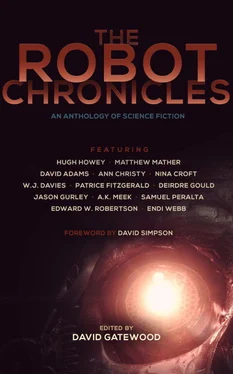“And?” Inga prompted.
“And how I paid for all the food he wasted by shoving it into a holding tank,” Hazel finished, her words coming out in an embarrassed rush.
Inga gasped at that. It was a terribly rude thing for her to have said. Definitely gasp-worthy.
Hazel shrugged it off. “I was running out of sensible things to say. It just sort of… popped out.”
She paused again, watching a pair of walkers stroll through the gardens. It struck her that she couldn’t tell which was the PePr and which was the human. So perfect was the liquid logic that ran their minds and the synth-mat self-healing flesh that covered them, they completely looked and acted the part. The latest musc-synth fiber muscles were so exquisite that even that last vestige of clunky mechanical support had now been eliminated. With all these technical achievements, they appeared in no way different from any other human. And really, what was the difference if no one could see it or sense it?
She sighed heavily and thought of Henry again. “There’s something else. Two things, really,” she confessed.
Her friends leaned in closer, anticipating something new and horrible.
“Uh-oh, what else could possibly go wrong?” Gemma asked.
“He’s been talking about a baby.”
There was no response. Or rather, no response that indicated they truly understood what that meant. She hadn’t been clear.
“I mean, he’s been talking about our baby. Having one together,” Hazel clarified.
That sent both friends into an uproar, exclamations running atop one another in their haste to express disbelief, disgust, or just plain shock.
“He’s demented. Like Inga said, he’s broken. You have to go to PePr! You shouldn’t even go home. That’s just crazy talk. Doesn’t he understand that a human and a PePr can’t have a baby? Doesn’t he understand the biology ?” asked Gemma. Her questions were almost rhetorical, they were so obvious and forcefully asked.
It was true that almost all children were born into couples made up of a PePr and a human, if for no other reason than that almost all couples were made up of a PePr and a human. But every child’s true parents were both—of necessity—human.
No PePr would undertake to usurp that. A matched set of donors or an approved friend pair would be the parents, with all their rights as such guaranteed. A PePr functioned as a nanny, confidant, and caregiver. What else could there be?
“And then there’s the issue of hygiene,” Hazel said, wanting to calm her friends with a less explosive problem.
Inga plucked at an invisible flaw on her skirt. “Hygiene issues are becoming frightfully common. Ivan is starting to have issues with that as well.”
She didn’t elaborate, but she didn’t have to. It had started the same with Henry, and had begun only weeks ago with Garrett—Gemma’s Match. It was a pattern that seemed to be repeating with Matches everywhere, and it didn’t bode well.
Inga stopped plucking at her dress and folded her hands neatly on top of her shiny patent leather purse. She switched her perfectly crossed ankles to the other side. She was the most prim of the three, her style and mannerisms almost a throwback to an earlier time. Her Ivan was the same, of course.
When Inga looked back up, Hazel tried to give her an encouraging smile, but Inga merely waved the concern away and said, “Oh, don’t mind me. Go on, Hazel.”
“We can talk about that if you want, Inga,” Hazel offered, half hoping she would want to, so that she could stop thinking about Henry for a while. But Inga didn’t, which put her back on the spot. “It’s not as if it’s unlivable or anything. But it wasn’t what I was led to expect, you see,” Hazel said.
Gemma and Inga nodded their understanding. A PePr was meant to round out a person—fill in all the missing pieces, as it were. It was meant to create a perfectly balanced pair, not just provide a convincingly human-looking robot . If a person is a natural nurturer, then their PePr will like to be nurtured—and will understand precisely how to return that nurturing. If a person is a slob, then a neatnik (and non-judgmental) PePr is called for. The build is so precise for every PePr that each one is as unique as any human.
Hazel had always had a caregiver personality: she was more comfortable doing for others than having things done for her. She also liked putting things in their proper place. The process of tidying up was one she’d always enjoyed—it gave her a sense of having done something tangible. She grew bored and restless if there was nothing to do, nothing to wash or straighten. And just sitting down for passive entertainment had never quite satisfied her. So, of course, Henry was an almost polar opposite.
But where he had started off being helpful—and just the right amount of untidy—he had now become downright slovenly. And although all skin, whether it be PePr synth-mat or human flesh, needed careful attention and cleaning, she was quite sure that Henry hadn’t so much as touched a shower in days.
Simply telling him what to do was out of the question. She had a job to do, duties that needed attending to, and friends to socialize with. Hazel went to work, earned the money they lived on, and took care of everything that needed tending. Henry had no need to even leave the apartment. She couldn’t be a housemother to an overgrown toddler on top of everything else.
“I’d rather not be too specific, but let’s just say that it’s gotten fairly offensive,” Hazel said with downcast eyes.
Gemma turned until her knees pressed into Hazel’s leg, took her hands, and gave them a firm squeeze. Hazel looked up and Gemma soothed her by rubbing her thumbs across the backs of her hands, a show of support and genuine caring.
Her tone was sincere but no less urgent than before. “Promise me you’ll go to PePr. This isn’t normal. I know as well as you do that the whole point of a PePr is to provide a truly human experience, but really—at some point it’s too much. Don’t you think you’ve reached that point? How much is one supposed to take?”
Inga’s small and delicate hand snaked across to rest atop Hazel’s wrist, another touch of comfort and friendship. In her light, clear, almost little-girl voice, she said, “This is happening everywhere. You’re not the only one dealing with it. There’s no reason for you to imagine you’ve failed somehow.”
They were right, and Hazel knew it. She couldn’t look at this as some failure of her own. It was a matching problem, or perhaps simply an issue of PePrs becoming too human. Simulated emotions filtered through liquid logic had simply become too real, something more than intended. New emotions had bubbled through, and PePrs could now be offended, even unstable. And that “something more than intended” was making Hazel’s day-to-day life a mess.
“You’re right,” Hazel responded and disengaged her hands. She pecked each of her friends’ cheeks and made a rapid departure. There was no sense lingering over it once a decision was made. It was best to just get on with it.
As Hazel strolled along, she brought up the location of the nearest full-service PePr facility on her interface. It was close enough to walk to, so she decided to just enjoy the spring air and fading light. Pushing thoughts of Henry away from the forefront of her mind was easy now that the decision was made. And when she reached the short strip of micro-shops that serviced this area, for a few precious moments he even slipped from her mind entirely.
Most things were best bought online, of course. Delivery was as fast as a drone or a purpose-built PePr messenger, and easier, too. But Hazel felt that nothing would ever completely replace the joy of real-world impulse-buying. No online image could replace the delight at discovering an item one didn’t know one simply must have until it was literally in front of one’s face.
Читать дальше






![Сидней Баундс - The Robot Brains [with w_cat]](/books/196989/sidnej-baunds-the-robot-brains-with-w-cat-thumb.webp)





